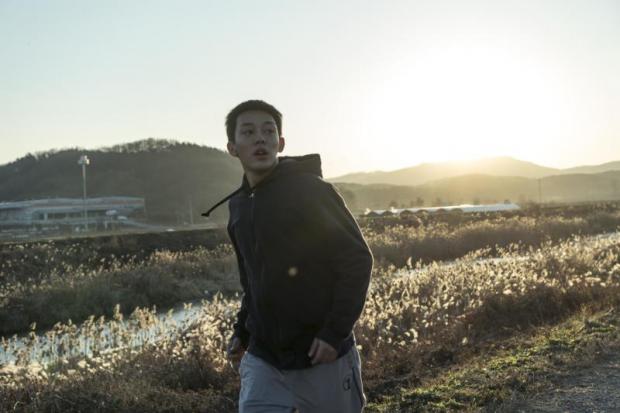The air in that rural village is impregnated by unsettling emotions and propaganda announcements from loudspeakers. Three people sit drinking and talking in front of an old house: an honest, confused young man; a pretty, even also confused young woman; and a rich, suave, sport-car-driving playboy, so sure of himself and the power he has over the other two.
It's a simple scene in Burning, Lee Chang-dong's psychodrama about romance, rage and class tension -- and like any simple scene in this South Korean director's films, it is wrought with rarefied mystery and vagueness. The three people present are Jong-su (Yoo Ah-in), an aspiring writer compelled by necessity to return to work in the farm of his father. The woman is Hae-mi (Jeon Jong-seo, in her spectacular debut), a woman who works odd jobs to save up money to travel to Africa. And there's Ben (Steven Yeun), a smooth-talking millionaire from Seoul who's going after the beautiful Hae-mi, and who, as he reveals, has a habit of burning down unused greenhouses in the countryside.
Running at 148 minutes, Burning is a slow-burn affair that will test, and reward, patient viewers -- not that all mysteries will be solved and gift-wrapped to our satisfaction, but the bottled-up enigma of the protagonists, especially Jong-su, will come blazing like a star. Lee Chang-dong is one of the most respected South Korean filmmakers (and also a former culture minister), and this is only the second time in 16 years that a film of his has had a commercial release in Thailand.
Burning has been adapted from a short story by Haruki Murakami, called Barn Burning. In a Murakami signature, the story is populated by people who suspect that the ground beneath their feet could slip off at any moment, and they cling to any hint of emotional certainty in a world where nothing seems certain. In the movie, writer-director Lee adjusts the sociological construct of the narrative by making Jong-su a working-class farm boy, and heightens the class-division narrative -- on top of the poetic, ungraspable feeling of the characters in constant search for a stable ground, or for some sort of security unavailable in their respective environments.
In Lee's previous film, Poetry (2010), a grandma with Alzheimer's tries to protect her boy from a murder charge. Back in 1999, Lee made the heart-wrenching Peppermint Candy, the film that established him as a forceful voice in the stratospheric rise of Korean cinema, and in which we follow a man whose loss of innocence mirrors the fate of his own country. Burning, on paper, is not a political film (Murakami is not much of a political writer), but Lee's realistic sketch of working-class life and the seduction of wealth invests the story with a sense of immediacy.
In a way, the film's midsection is a gamble: a long indulgence in narrative build-up for the climax. The three actors, however, move us, each in their own tragic way. Jeon Jong-seo, as the woman at the centre, appears in her acting debut and she will have a bright future after this. Yoo Ah-in, as the aspiring writer getting lost in his condition, is a tragic-hero consumed by emotions he himself doesn't understand. And Steven Yeun, a Korean-American actor, is captivating in his mix of devilish charm and melancholic entitlement. Among them, everything is burning, and fire is the only element that can warm their cold, heartless world.

